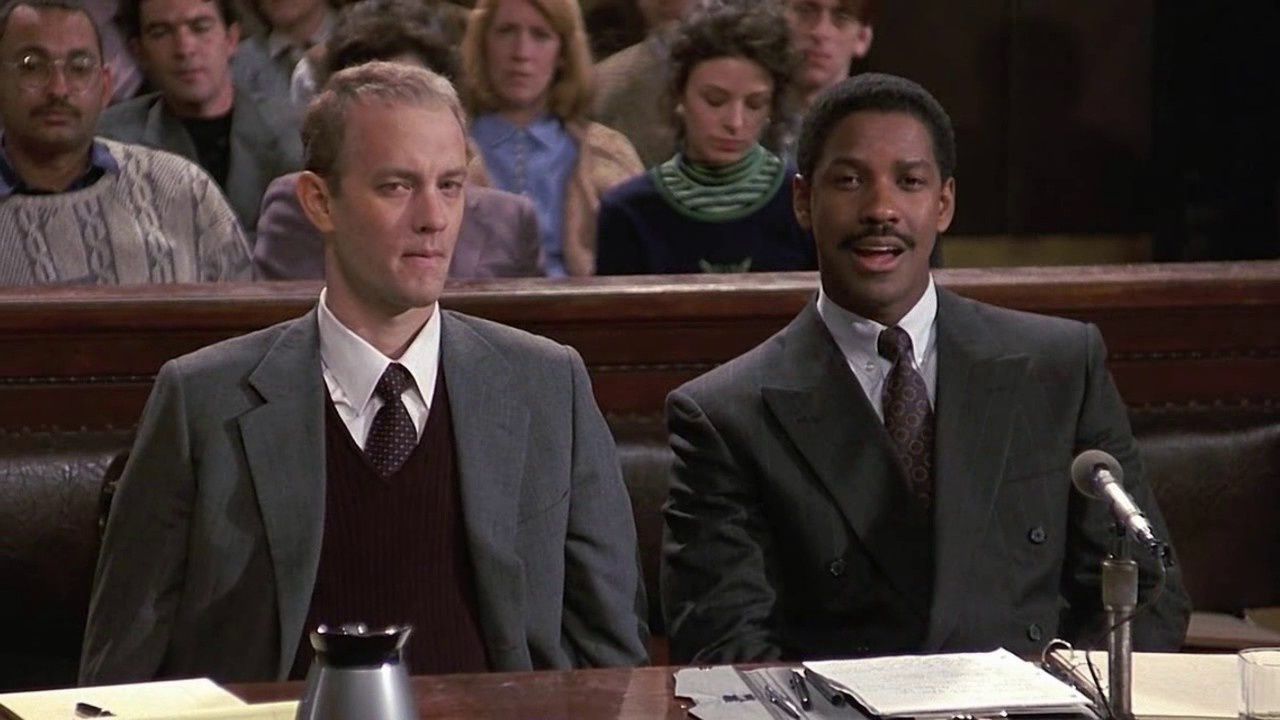← Back to Reviews
in
That line is from an aria called "La mamma morta", from the opera Andrea Chénier, where the lead character, a woman, tells of how during the French Revolution, a mob killed her mother and set fire to their house, leaving her alone. Attorney Andrew Beckett (Tom Hanks) recalls it with particular solemnity, which turns into outright pain as the aria goes on. You see, Andrew finds himself in a similar situation. The place where he was born, where he has lived, is figuratively "burning" with intolerance to the point where he feels abandoned, alone.
Philadelphia follows the events that led Andrew to this state, as he was inexplicably fired by his law firm. To aid him, he recruits fellow attorney Joe Miller (Denzel Washington) to help him prove that the dismissal was not only because of his AIDS diagnosis, but simply because he's gay.
This is probably the third or fourth time I see this film. I read a review from the late 2000s where I was a bit more enthusiastic, but make no mistake: this is still a very powerful film with two excellent performances in the lead. Washington is his usual cool, laid-back self, but excels when the moment calls for him to show fear, ignorance, and lack of understanding.
But oh my, how good is Tom Hanks in this. Yes, at the time it was a surprising turn from an actor that specialized in comedies and lighter fare. But seeing it now, already used to Hanks as a serious actor, I found his performance just as powerful as before, if not more. There are lots of moments of nuance and subtlety in his performance, but the way he peaks in the above quoted scene is magnificent.
The rest of the cast is just as solid, with Antonio Banderas delivering a performance that feels natural and charismatic in a relatively short screen time as Miguel, Andy's boyfriend. Jason Robards rounds out the main cast as Andy's boss. As usual, he's good, but his performance is a bit hampered by some clumsy dialogue and a script that antagonizes him too much. I feel that his character and his overall relationship with Andy could've been more dimensional, making the events of the trial more effective.
But those issues are not exclusive to Robards' character. The script has some moments where it tries to highlight the overall attitude towards homosexuals, but also to show Miller's own prejudices, inner struggles and subsequent growth. Unfortunately, they are clunkily executed in most cases, which ultimately hinders their effect.
It's surprising and sad that almost 30 years after its release, the situation for homosexuals and the whole LGBTQ+ community hasn't changed much. Let's hope that we can all extend our hands to them and help them feel not alone.
Grade:
PHILADELPHIA
(1993, Demme)
A film about LGBTQ+ lifestyles

(1993, Demme)
A film about LGBTQ+ lifestyles

"Look, the place that cradled me is burning... I'm alone."
That line is from an aria called "La mamma morta", from the opera Andrea Chénier, where the lead character, a woman, tells of how during the French Revolution, a mob killed her mother and set fire to their house, leaving her alone. Attorney Andrew Beckett (Tom Hanks) recalls it with particular solemnity, which turns into outright pain as the aria goes on. You see, Andrew finds himself in a similar situation. The place where he was born, where he has lived, is figuratively "burning" with intolerance to the point where he feels abandoned, alone.
Philadelphia follows the events that led Andrew to this state, as he was inexplicably fired by his law firm. To aid him, he recruits fellow attorney Joe Miller (Denzel Washington) to help him prove that the dismissal was not only because of his AIDS diagnosis, but simply because he's gay.
This is probably the third or fourth time I see this film. I read a review from the late 2000s where I was a bit more enthusiastic, but make no mistake: this is still a very powerful film with two excellent performances in the lead. Washington is his usual cool, laid-back self, but excels when the moment calls for him to show fear, ignorance, and lack of understanding.
But oh my, how good is Tom Hanks in this. Yes, at the time it was a surprising turn from an actor that specialized in comedies and lighter fare. But seeing it now, already used to Hanks as a serious actor, I found his performance just as powerful as before, if not more. There are lots of moments of nuance and subtlety in his performance, but the way he peaks in the above quoted scene is magnificent.
The rest of the cast is just as solid, with Antonio Banderas delivering a performance that feels natural and charismatic in a relatively short screen time as Miguel, Andy's boyfriend. Jason Robards rounds out the main cast as Andy's boss. As usual, he's good, but his performance is a bit hampered by some clumsy dialogue and a script that antagonizes him too much. I feel that his character and his overall relationship with Andy could've been more dimensional, making the events of the trial more effective.
But those issues are not exclusive to Robards' character. The script has some moments where it tries to highlight the overall attitude towards homosexuals, but also to show Miller's own prejudices, inner struggles and subsequent growth. Unfortunately, they are clunkily executed in most cases, which ultimately hinders their effect.
It's surprising and sad that almost 30 years after its release, the situation for homosexuals and the whole LGBTQ+ community hasn't changed much. Let's hope that we can all extend our hands to them and help them feel not alone.
Grade:
